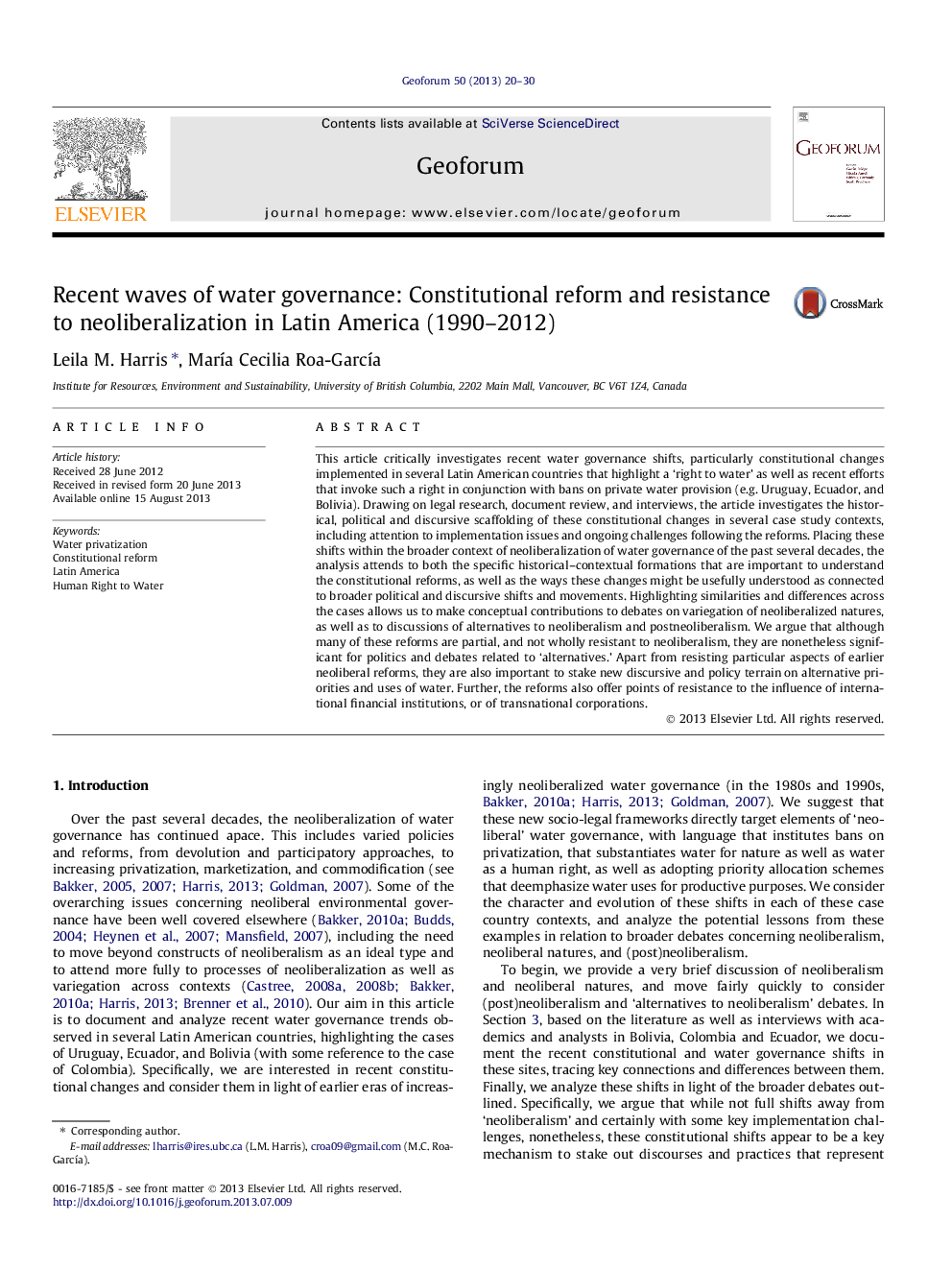| کد مقاله | کد نشریه | سال انتشار | مقاله انگلیسی | نسخه تمام متن |
|---|---|---|---|---|
| 5074116 | 1477139 | 2013 | 11 صفحه PDF | دانلود رایگان |
عنوان انگلیسی مقاله ISI
Recent waves of water governance: Constitutional reform and resistance to neoliberalization in Latin America (1990-2012)
ترجمه فارسی عنوان
امواج اخیر حاکمیت آب: اصلاحات قانون اساسی و مقاومت در برابر نولیبرالیسم در آمریکای لاتین (1990-2012)
دانلود مقاله + سفارش ترجمه
دانلود مقاله ISI انگلیسی
رایگان برای ایرانیان
کلمات کلیدی
خصوصی سازی آب، اصلاحات قانون اساسی، آمریکای لاتین، حقوق بشر برای آب،
ترجمه چکیده
این مقاله به طور انتقادی از تغییرات اخیر حاکمیت آب، به ویژه تغییرات قانون اساسی که در چندین کشور آمریکای لاتین اعمال شده است، اشاره می کند که "حق آب" را برجسته می کنند و همچنین تلاش های اخیر که به موجب آن ممنوعیت تامین آب خصوصی (مانند اروگوئه، اکوادور، و بولیوی) در مقاله ای که به بررسی تحقیقات قانونی، بررسی سند و مصاحبه ها پرداخته شده است، این مقاله به بررسی مسائل تاریخی، سیاسی و گفتمانی از این تغییرات قانون اساسی در زمینه های مختلف مورد مطالعه می پردازد، از جمله توجه به مسائل پیاده سازی و چالش های در حال انجام پس از اصلاحات. قرار دادن این تغییرات در بستر وسیع نولیبرالیسم مدیریت آب در چند دهه گذشته، تجزیه و تحلیل در مورد هر دو شکل خاص تاریخی-زمینه ای است که برای درک اصلاحات قانون اساسی و روش های این تغییرات مفید است متصل به شیوه ها و جنبش های سیاسی و گفتاری گسترده تر. برجسته کردن شباهت ها و تفاوت ها در موارد، ما را قادر می سازد تا به مباحثه درباره تغییرات طبیعت نئولیبرالیزه، و نیز بحث های جایگزین نئولیبرالیسم و بعد از نئولیبرالیسم، کمک کنیم. ما استدلال می کنیم که اگر چه بسیاری از این اصلاحات جزئی و نه به طور کامل به نئولیبرالیسم مقاوم هستند، اما برای سیاست و بحث های مربوط به "جایگزین" اهمیت زیادی دارد. به غیر از مقاومت در برابر جنبه های خاص اصلاحات پیشین نئولیبرال، آنها برای اهداف واژگان و سیاست های جدید در مورد اولویت های جایگزین و استفاده از آب نیز مهم هستند. علاوه بر این، اصلاحات نیز نقاط مقاومت در برابر نفوذ موسسات مالی بین المللی یا شرکت های فراملیتی را ارائه می دهند.
موضوعات مرتبط
علوم انسانی و اجتماعی
اقتصاد، اقتصادسنجی و امور مالی
اقتصاد و اقتصادسنجی
چکیده انگلیسی
This article critically investigates recent water governance shifts, particularly constitutional changes implemented in several Latin American countries that highlight a 'right to water' as well as recent efforts that invoke such a right in conjunction with bans on private water provision (e.g. Uruguay, Ecuador, and Bolivia). Drawing on legal research, document review, and interviews, the article investigates the historical, political and discursive scaffolding of these constitutional changes in several case study contexts, including attention to implementation issues and ongoing challenges following the reforms. Placing these shifts within the broader context of neoliberalization of water governance of the past several decades, the analysis attends to both the specific historical-contextual formations that are important to understand the constitutional reforms, as well as the ways these changes might be usefully understood as connected to broader political and discursive shifts and movements. Highlighting similarities and differences across the cases allows us to make conceptual contributions to debates on variegation of neoliberalized natures, as well as to discussions of alternatives to neoliberalism and postneoliberalism. We argue that although many of these reforms are partial, and not wholly resistant to neoliberalism, they are nonetheless significant for politics and debates related to 'alternatives.' Apart from resisting particular aspects of earlier neoliberal reforms, they are also important to stake new discursive and policy terrain on alternative priorities and uses of water. Further, the reforms also offer points of resistance to the influence of international financial institutions, or of transnational corporations.
ناشر
Database: Elsevier - ScienceDirect (ساینس دایرکت)
Journal: Geoforum - Volume 50, December 2013, Pages 20-30
Journal: Geoforum - Volume 50, December 2013, Pages 20-30
نویسندگان
Leila M. Harris, MarÃa Cecilia Roa-GarcÃa,
